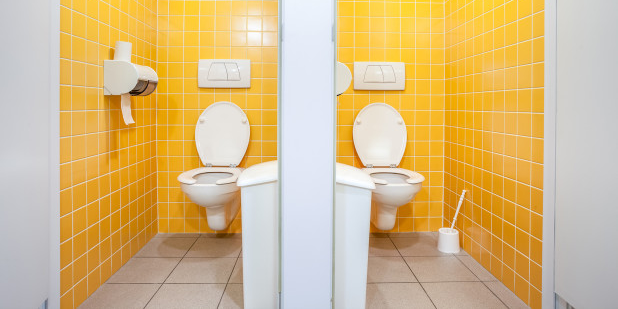Travel constipation. If you have it, you know. You may be as regular as the day is long when you’re at home, but the second you go out of town for a night or more, BOOM, everything stops, and you suddenly can’t go for days on end.
Although travel constipation may or may not be listed in typical doctors’ handbooks, anyone who has it can tell you it’s a real thing. In fact, about 40% of us regularly experience it during travel. Here’s a little bit about why it probably happens and, more so, what you can do to try to relieve it or possibly even prevent it altogether.
Possible Causes (why you can’t go)
If you’re one of the 40% who experience travel constipation, knowing the possible causes can be the first step to fixing it.
You’re in a new, different place & your body knows it
Your gut bacteria (the normal, good stuff that’s supposed to be there) is thrown off when you travel. “Any time you leave your general habitat, it’s throwing your gut microflora off balance,” says Brooke Alpert, a New York-based registered dietician.
Sitting on a plane
For some people that starts before you even get to your destination because just the traveling from point A to point B can cause constipation. Movement stimulates the gut, so when you sit on a plane or in a car for long periods of time, it can cause your intestines to clog. Ignoring the urge to go while in the air or on the road can also make it more difficult once you finally do sit down on the toilet.
Dietary changes
Chances are when you’re home, you have a relatively regular life schedule. You wake up, go to work, come home, exercise regularly (right?), and your meals are at a somewhat regular schedule (right??) and hopefully include some bulkier and/or fiber-rich foods such as whole grains and cereals and fruits & vegetables (right???).
When you’re traveling, a lot gets put to the wayside. That free continental breakfast has no fiber, you may eat more bread-based and greasy foods while out of town, you’re eating at oddball times and you’re consuming stuff you usually don’t. Too much caffeine and/or booze, for example, can make you dehydrated. All of that can cause your colon to not do its job as efficiently as usual.
The time change
Time change and jet lag can cause constipation, too. Most people tend to go at roughly the same time every day at home, and that goes back to having a relatively regular schedule. Suddenly what your body thinks should be 8am is actually 5am and you’re sleeping when the urge to go hits, or your 8am is now 4pm and you’re at the tail end of a meeting and hold it in longer than you should. Withholding your stools makes them impact and dry out, which essentially makes a “plug” and jams everything up.
Stress
Your gut is influenced by stress – remembering to pack everything, navigating crowds at an airport, wondering whether or not your plane will be in time and you’ll catch your connection, the screaming baby 2 rows behind you, hoping your checked luggage isn’t lost, even staying with family for an extended period of time – the stress of any or all of those could all stop your colon from functioning the way it usually does.
Travel could include the anxiety of having to use a squat toilet or even just a hole in the ground when you’re not used to it. Some people just aren’t comfortable using anything but their own toilets. Others don’t want to go if there’s anyone around and someone who usually usually lives alone, or uses the downstairs bathroom while the rest of the family is upstairs is now forced to go in an unfamiliar hotel room with another person or people sharing the same hotel room. Poop anxiety can cause you to subconsciously hold it in.
What To Do About It
- Drink more water and less alcohol to help curb dehydration.
- Fermented foods like sauerkraut, pickles and live-cultured yogurt are probiotics and can help soothe intestines so they’re more willing to relax and “go.”
- Keep up your exercise routine, or at least walk as much as you can. Exercise increases the motility of the GI tract.
- If you’re doing a road trip, take frequent breaks to move around.
- If it’s realistic, try to wake up and go to bed as close to the times you do at home, so you can maintain your circadian rhythm, which regulates the hormones that play a role in digestion.
- If you know you’re prone to travel constipation, consider using a gentle stool softener a few days before you leave and keep it up while you’re out of town.
- If you get the urge to go, go! Holding it in will only worsen constipation.
Best photo for a stool-related product EVER. Via www.denemeezi.com
Good luck!
Travel constipation is a pain in the butt (and the intestines, and…) but there are ways to try to prevent it, as well as ways to try to relieve it. Trying to keep your routine as close to normal as possible when you’re in a not normal place, doing not normal things is, I know, not easy. But the closer you can be to your normal, the more your bowels may thank you in the one way they know how. 💩 <– you KNEW I couldn’t get through this post without just ONE little poop emoji, right?
Want to comment on this post? Great! Read this first to help ensure it gets approved.
Want to sponsor a post, write something for Your Mileage May Vary, or put ads on our site? Click here for more info.
Like this post? Please share it! We have plenty more just like it and would love it if you decided to hang around and sign up to get emailed notifications of when we post.
Whether you’ve read our articles before or this is the first time you’re stopping by, we’re really glad you’re here and hope you come back to visit again!
This post first appeared on Your Mileage May Vary
Join our mailing list to receive the latest news and updates from our team.

